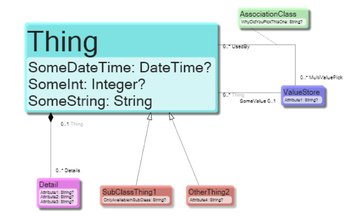OCLOperators allInstances
No edit summary |
m (Lars moved page Allinstances operator to OCLOperators allInstances: Not exactly the right URL (needed for designer lookup)) |
(No difference)
| |
Revision as of 13:28, 9 August 2017
This page was created by Alexandra on 2017-08-08. Last edited by Stephanie on 2025-03-18.
It is a common operator. To find all available you can open the OCL-Editor and type in a class:
Your model is central to all expression you will handle. We will use this model to for the examples:
| Operators | Description |
|---|---|
| Thing.allinstances | Gives you a list of all Things |
| Things.allinstances->select(someInt>3) | Only things with someInt bigger than 3 |
| Thing.allinstances->select( (someInt>3) and (someInt<6)) | Only things with someInt bigger than 3 but less than 6. Notice the extra parenthesis to or the Boolean expressions together |
| Things.allinstances->select(x|x.someInt>3) | Here we introduce the loop variable x. We separate the definition of x from the usage of x with the pipe sign “|”. Loop variables are optional but if names are unique – but you will need to use them to give precision or to if you want to perform operations on the loop context itself. |
| Things.allinstances.Details | Gives a list of all detail objects that are connected to a Thing. The Detail objects that float around without a Thing will not be in the list |
| Things.allinstances.Details.Attribute1 | A list of nullable strings from the contents from the details attribute1. Note that OCL is null-tolerant – you do not need to check if the Details exists of not – the language handles null checks for you |
| SubClassThing1.allinstances.Details | Inherited features of classes are directly accessible |
| Thing.allInstances- >select(x|x.safeCast(SubClassThing1). OnlyAvailableInSubClass='Hello') | Filtering on Specialization is done with an operator SafeCast. This is null safe so for all objects that do not fit the profile the expression returns false |

